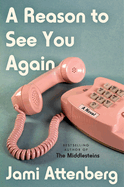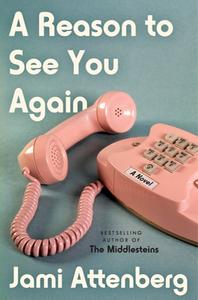
 "Oh, the games families play with each other." So opens Jami Attenberg's 10th book, A Reason to See You Again, which evinces her mastery of dysfunctional family stories. The novel spans 36 years, zooming in for vignettes that illuminate one Jewish nuclear family. The Cohens experience estrangement and reunion, their circle widening and retracting as partners and friends enter and exit the picture. Meanwhile, the characters grapple with sexuality and addictions as they ultimately decide between hiding and figuring out who they really are.
"Oh, the games families play with each other." So opens Jami Attenberg's 10th book, A Reason to See You Again, which evinces her mastery of dysfunctional family stories. The novel spans 36 years, zooming in for vignettes that illuminate one Jewish nuclear family. The Cohens experience estrangement and reunion, their circle widening and retracting as partners and friends enter and exit the picture. Meanwhile, the characters grapple with sexuality and addictions as they ultimately decide between hiding and figuring out who they really are.
The action opens in 1971, on Rudy Cohen, a 41-year-old Holocaust survivor; his wife, Frieda, who works in a nursing home; and daughters Nancy, 16, and Shelly, 12. Every Saturday evening they play three Scrabble matches. The wholesome family routine can't last, though: Rudy is ill and, in the first of many flash-forwards, Attenberg divulges his death a year later. Frieda attempts to assuage loneliness through substance abuse. Nancy gets pregnant at 21 and later becomes a wellness coach. Shelly, a math genius, moves to Seattle to work on early cell phones.
The close third-person perspective shifts effortlessly between perspectives. Chapters fall into thematic sections named for common experiences such as "Moves," "Emergencies," and "Confessions." The focus is on three generations of women: Frieda, Nancy, and Shelly, and Nancy's daughter, Jess. Patterns of psychological damage repeat as Nancy follows Frieda into alcoholism and emotional abandonment of her child. Specific incidents also recur, such as male bosses sexually harassing young female employees. Shelly is particularly noteworthy as a childfree woman in STEM who becomes her artist niece's chief supporter.
Attenberg (I Came All This Way to Meet You, 1000 Words) knows where to shine a spotlight to reveal characters' personalities and dynamics. Visiting Nancy, Shelly is taken aback by a 20-foot Christmas tree and mountain of presents for four-year-old Jess. The extravagant holiday display can't hide the tension between Nancy and her philandering husband, Robby. Nancy pulling the plug on Christmas foreshadows the failure of their marriage. In another unforgettable scene, Shelly and Jess stumble on Rudy's silk robes and Shelly explains that he was a closeted homosexual--all the more poignant because of Shelly's latent love for a female colleague and Jess's gay future.
The constant challenge is to break free and start over. Attenberg's characters are as loveable as they are maddening, and the combination of choices and luck makes the novel's events feel as random--and genuine--as real life. --Rebecca Foster, freelance reviewer, proofreader and blogger at Bookish Beck
Shelf Talker: Jami Attenberg's seventh novel is another masterful dysfunctional family story, this time focusing on the love lives and careers of three generations of women.

